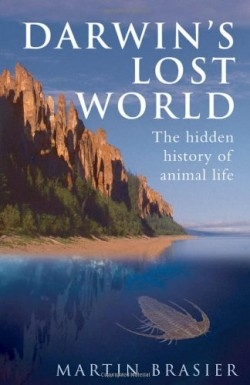Darwin's Lost World
The Hidden History of Animal Life
Controversy has tailed the theory of evolution ever since the publication of Charles Darwins On the Origin of Species in 1859. As recently as 2004, National Geographic magazine published an article titled, “Was Darwin Wrong?” The cover story in the February 2009 issue of that same magazine proclaimed, “What Darwin Didnt Know.”
Paleontologist Martin Brasier is a person who knows, firsthand, what Darwin didnt know-and he convincingly documents it in Darwins Lost World. This book is both a scientific report and a personal journal of Brasiers quest to solve a mystery that puzzled Darwin himself: Why did there appear to be an absence of animal fossils in rocks older than the Cambrian period? This, says Brasier, is the “Lost World that was later found to have spanned more than eighty percent of Earth history.”
Brasier begins with a wonderful journalistic technique: bringing the reader into Darwins home in January 1859. He presents an intimate portrait of a beleaguered scientist, pondering the puzzle that would be known by some as “Darwins Dilemma.” Brasier then starts to weave the story of his own journey, which began in 1969, to pursue the “Lost World.” Brasier takes the reader on an exploratory adventure spanning more than two decades that includes such far-flung places as Mongolia, Newfoundland, Scotland, and the island of Barbuda.
Along the way, readers discover numerous evolutionary clues, thanks to Brasier. Perhaps most interesting is the finding of worm tracks in 542 million-year-old Cambrian rocks on the Newfoundland shoreline. Its not so much what Brasiers discovery represents thats interesting, as it is the way he depicts it: “the circus of performing worms.” The author imagines a performance of worms, serpents, and other creatures-rolling, stretching, whirling, and weaving as if they are in front of an audience. Behind this fanciful description, though, lies its scientific significance: “These scribbles left behind by animals on the ancient seabed are some of our strongest clues concerning happenings near to the start of the Cambrian.”
The “circus of worms” is indicative of why Darwins Lost World is entertaining rather than dry and boring. While Brasier covers highly technical ground that could potentially interest only scientists, he has an engaging style and a delightful sense of humor that make his book compelling reading for the layman. This is one scientific account that is both instructive and enjoyable to read.
Reviewed by
Barry Silverstein
Disclosure: This article is not an endorsement, but a review. The publisher of this book provided free copies of the book to have their book reviewed by a professional reviewer. No fee was paid by the publisher for this review. Foreword Reviews only recommends books that we love. Foreword Magazine, Inc. is disclosing this in accordance with the Federal Trade Commission’s 16 CFR, Part 255.

